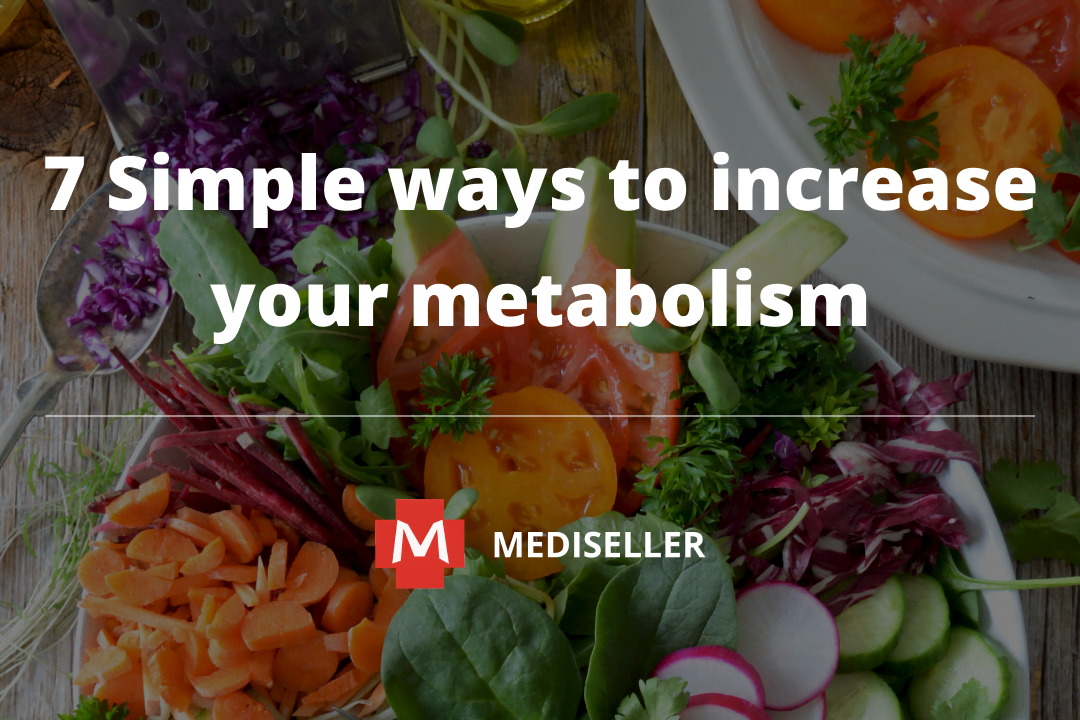Metabolism refers to the rate at which the body burns calories for energy. This rate is relative to various factors, which include activity level, body fat, mass, age, sex, etc.
Poor eating habits and following a lifestyle of low activity contributes to less burning of calories. By taking correct measures you can take control of your metabolism level, measures such as getting more sleep and eating all day.
Having a strong metabolism will forever help you in your life. There are several ways that will contribute to increment the metabolism rate.

Getting more sleep
Believe it or not, your sleep cycle has a great impact on your body fat.
The research concluded that not getting proper sleep can result in a high level of hormones that control your hunger and appetite. Resulting in an increase in fat cells, you tend to eat more than what is required, thus, causing extra weight.
Lack of Sleep is associated with the risk of obesity because sleep deprivation negatively affects metabolism. Not getting the appropriate amount of sleep also contributes to an increase in blood sugar levels and insulin resistance
Now you may ask, how many hours of sleep is actually needed by the human body, well it depends on multiple factors, but experts recommend that 7-8 hours is the appropriate amount.

Small meals
Instead of eating heavy meals during the traditional meal timings of the day, it is suggested to eat small but more frequent meals throughout the day. The reason backing this theory is, when there are long gaps between the meal timings, the body goes under “Starvation Mode” which is similar to the battery-saver mode in your smartphone. The body tends to conserve energy in every way possible, thus, slowing down the metabolism process. However, many people experience weight loss through intermittent fasting, thus, it is not a universal fact and it varies from person to person.
Eating healthy snacks also contributes to an increase in metabolism.

Coffee
A study concluded that coffee has been shown to be effective in increasing the rate of metabolism, mainly because of the presence of caffeine. It significantly increased the rate of metabolism for both normal weight and obese people. But also bear in mind that excessive consumption of coffee is very harmful to the body and can also cause insomnia, nervousness, increased palpitation of the heart, and other negative side effects.

Green tea
Green tea which is mainly known for being an excellent source of antioxidants contributes to the increase of metabolism. Apart from creating an impact on the rate of metabolism it helps in the detoxification and tearing down unnecessary fat by converting the fat into free fatty acids, thus, increasing the fat burn by 10-17%
These teas help convert some of the fat stored in your body into free fatty acids, which may increase fat burning by an average of 14%.
Green tea turns out to be the perfect alternative to sugar drinks, plus it also ensures that the person stays hydrated. Though few studies conclude the opposite, that Green tea does not create an impact on metabolism, thus, their effect may or may not work for all.

Drinking more Water
Those who prefer to go with water instead of drinks that contain sugar are more inclined towards losing water and also keeping it that way. The reason behind this is obvious because sugary drinks carry a lot of calories and if you replace them with water you’ve automatically eliminated the extra calorie intake.
Drinking water also contributes to the speeding of metabolism.
Some even suggest that cold water works better in increasing metabolism, mainly because your body utilizes energy to heat the intake up to the body temperature.
Water also helps in an in-direct way. Drinking water half an hour before a meal will result in eating less, thus, help the person to lose weight.
In a study, it was concluded that overweight adults who drank .5 liter of water before a meal, had a 44% greater decline in weight than those who didn’t.
The low water level is also linked with major weight gain. Many confuse dehydration with the feeling of hunger, so instead of going for an unhealthy snack, drink some cold water.
Maintaining a healthy water level also aids in absorbing/ extracting the nutrients and minerals of the food that we consume, thus increasing metabolism.

Increasing body activity
Exercising directly impacts the rate of metabolism of your body, especially, cardiovascular exercises which include running, walking, swimming, aerobics. Exercising helps you in burning calories.
High-intensity interval training (HIIT) has a great impact on metabolism. Unlike cardio exercises, HIIT does not include running, swimming, cycling but instead a unique pattern of high and low-intensity exercises.
HIIT may involve running for a minute and walking for another two and switching between them.

Increase Protein Intake
Consuming foods that are high in protein contributes to the rate of metabolism, mainly due to the high thermic effect.
An increased intake of protein has shown to promote metabolism and burning of calories by about 80 to 100 per day.
With this effect of burning more calories, high protein diets have an advantage over low protein diets for metabolism.
Considering all this, one should consider adding more high-protein food to their diet.



.png)
.png)
.png)
.png)
.png)
.png)
.png)
.png)


0 Comment